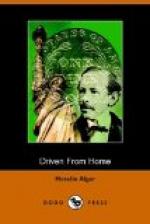“Leonard Craig.”
“But what could induce him to do it?” said Carl, perplexed.
“He thought that I would see the letter, and would be prejudiced against you if I discovered that you were investing in what is a species of lottery.”
“Would you, sir?”
“I should have thought you unwise, and I should have been reminded of a fellow workman who became so infatuated with lotteries that he stole money from his employer to enable him to continue his purchases of tickets. But for this unhappy passion he would have remained honest.”
“Leonard must dislike me,” said Carl, thoughtfully.
“He is jealous of you; I warned you he or some one else might become so. But the most curious circumstance is, he wrote a second letter in his own name. I suspect he has bought a ticket. I advise you to say nothing about the matter unless questioned.”
“I won’t, sir.”
The next day Carl met Leonard in the street.
“By the way,” said Leonard, “you got a letter yesterday?”
“Yes.”
“I brought it to the factory with the rest of the mail.”
“Thank you.”
Leonard looked at him curiously.
“He seems to be close-mouthed,” Leonard said to himself. “He has sent for a ticket, I’ll bet a hat, and don’t want me to find out. I wish I could draw the capital prize—I would not mind old Jennings finding out then.”
“Do you ever hear from your—friends?” he asked a minute later.
“Not often.”
“I thought that letter might be from your home.”
“No; it was a letter from Syracuse.”
“I remember now, it was postmarked Syracuse. Have you friends there?”
“None that I am aware of.”
“Yet you receive letters from there?”
“That was a business letter.”
Carl was quietly amused at Leonard’s skillful questions, but was determined not to give him any light on the subject.
Leonard tried another avenue of attack.
“Oh, dear!” he sighed, “I wish I was rich.”
“I shouldn’t mind being rich myself,” said Carl, with a smile.
“I suppose old Jennings must have a lot of money.”
“Mr. Jennings, I presume, is very well off,” responded Carl, emphasizing the title “Mr.”
“If I had his money I wouldn’t live in such Quaker style.”
“Would you have him give fashionable parties?” asked Carl, smiling.
“Well, I don’t know that he would enjoy that; but I’ll tell you what I would do. I would buy a fast horse—a two-forty mare—and a bangup buggy, and I’d show the old farmers round here what fast driving is. Then I’d have a stylish house, and——”
“I don’t believe you’d be content to live in Milford, Leonard.”
“I don’t think I would, either, unless my business were here. I’d go to New York every few weeks and see life.”
“You may be rich some time, so that you can carry out your wishes.”




